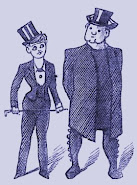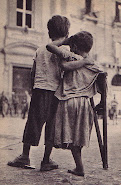My eye was caught by a series of
letters to the editor of the New York Sun, Sunday, September 21, 1902, under
the title ‘The Cuckoo, not Irish?’
TO THE EDITOR OF THE SUN – Sir. Oh,
no. Ireland must not claim the cuckoo song! My Wentleydale mother, who came
from Yorkshire, England, in the ’30s, recited the lines to her Pennsylvania
children forty years ago. But with her the lines ran thus:
“The cuckoo is a pretty bird,
He sings as he flies;
He brings us good tidings
And tells us no lies.
He eats little birds’ eggs
To make his voice clear
And he never sings cuckoo
Till summer is near.”
Another tells me it is an old County Mayo song – very long – with a
pretty tune. It is evidently a folk song. I hope to hear more about it. –
Brooklyn, Sept. 19.
P.W.S.
Three other letters gave the same quotes with minor lyric variations.
The most celebrated version of the ‘Coo-coo Bird’ was the Clarence Ashley
tune recorded on October 23, 1929, in Johnson City, Tennessee, and re-released on
Harry Smith’s Anthology of American Folk Music in 1952. I missed it that time
around but finally heard his song with a new release on August 19, 1997. It was actually two songs, a merger of ‘The Cuckoo’ and the gambling song ‘Jack 'o Diamonds.’
Gonna build me log cabin
on a mountain so high
So I can see Willie
as he goes on by
Um hmm hmm...
Oh the coo-coo is a pretty bird
She wobbles (*or warbles) as she flies
She never hollers coo-coo
’Til the fourth day of July
I’ve played cards in England
I’ve played cards in Spain
I’ll bet you ten dollars
I’ll beat you next game
Jack of diamonds,
Jack of diamonds
I’ve known you from old
Now you’ve robbed my poor pockets
Of my silver and my gold
Um hmm hmm...
I’ve played cards in England
I’ve played cards in Spain
I’ll bet you ten dollars
I beat you this game
Oh the coo-coo is a pretty bird
She wobbles as she flies
She never hollers coo-coo
’Til the fourth day of July
The first time I heard the song was in 1965 as performed by Tom Rush
(spelled ‘The Cuckoo’) on Elektra records. Rush used the lyrics as sung by
Clarence Ashley in 1929 but where Ashley played it as a banjo song Tom Rush
featured guitar, with some very Elizabethan sounding riffs giving the song a
mysterious haunted feel. Tom Rush added a floating verse or two
Well I’ll sell you one gallon
For a two dollar bill,
Well I’ll eat when I'm hungry
Well I’ll drink when I’m dry
If some woman don’t kill me then I’ll live till I die.
Well for workin’ I’m too lazy,
And beggin’ that’s too low.
Well train robbin’,
That’s too dangerous,
So again I’ll go.
Much ink has been expended on the lines “Gonna build me log cabin, on a
mountain so high, So I can see Willie, as he goes on by.” It does sound
mysterious but the words are common in another ancient song, ‘Down in the Valley,’
also known as ‘Birmingham Jail,’ which was recorded by The Andrews Sisters and
by Burl Ives. The lyrics are
Build me a castle, forty feet high;
So I can see her as she rides by,
As she rides by, dear, as she rides by,
So I can see her as she rides by.
Ashley was engaged in the dangerous sideline business of bootlegging
moonshine. The vaguely sinister ‘Willie’ lines might have referred to a rival
bootlegger or a revenue agent. Tom Rush seems to have picked up on that idea
with
Well I’ll sell you one gallon
For a two dollar bill
 |
| The Book of Nursery Rhymes Complete, 1846 |
A fragment of ‘The Coo-Coo Bird’ was added to an Irish street ballad
named ‘The Streets of Bunclody.’ That incorporated fragment originated in a
common nursery rhyme of the British Isles. ‘The Streams of Bunclody’ was an old
Irish street ballad recorded in the 1888 book Irish Minstrelsy; being a
selection of Irish Songs, Lyrics and Ballads, London: Walter Scott, 24 Warwick
Lane, Paternoster Row.
O was I at the moss-house where the birds do increase,
At the foot of Mount Leinster or some silent place
Near the streams of Bunclody, where all pleasures do meet,
And all I’d require is one kiss from you, sweet.
If I was in Bunclody I would think myself at home,
’Tis there I would have a sweetheart, but here I have none.
Drinking strong liquor in the height of my cheer –
Here’s a health to Bunclody and the lass I love dear.
The cuckoo is a pretty bird, it sings as it flies,
It brings us good tidings and tells us no lies,
It sucks the young bird’s eggs to make its voice clear,
And it never cries cuckoo till the summer is near.
If I was a clerk and could write a good hand,
I would write to my true love that she might understand,
I am a young fellow that is wounded in love,
That lived by Bunclody, but now must remove.
If I was a lark and had wings, I then could fly,
I would go to yon arbour where my love she does lie,
I’d proceed to yon arbour where my love does lie,
And on her fond bosom contented I would die.
The reason my love slights me, as you may understand,
Because she has a freehold, and I have no land,
She has a great store of riches and a large sum of gold,
And everything fitting a house to uphold.
So adieu, my dear father, adieu, my dear mother,
Farewell to my sister, farewell to my brother;
I’m going to America, my fortune for to try;
When I think upon Bunclody, I’m ready for to die!
In October 1778 the famed Mrs. Jordan started “the fashion of singing ‘The Cuckoo Song’ in London theatres. The visiting American actress Fanny
Davenport chimed in, followed by Mrs. Kendal. ‘The Cuckoo Song’ as sung by Mrs.
Jordan, without the accompaniment of music, was beautiful beyond description.”
The author of the song was William Shakespeare, the song; ‘When daisies pied’
from Love’s Labour’s Lost.
When daisies pied and violets blue
And lady-smocks all silver-white
And cuckoo-buds of yellow hue
Do paint the meadows with delight,
The cuckoo then, on every tree,
Mocks married men; for thus sings he,
Cuckoo;
Cuckoo, cuckoo: O, word of fear,
Unpleasing to a married ear!
When shepherds pipe on oaten straws,
And merry larks are ploughmen’s clocks,
When turtles tread, and rooks, and daws,
And maidens bleach their summer smocks,
The cuckoo then, on every tree,
Mocks married men; for thus sings he,
Cuckoo;
Cuckoo, cuckoo: O, word of fear,
Unpleasing to a married ear!
When icicles hang by the wall,
And Dick the shepherd blows his nail,
And Tom bears logs into the hall,
And milk comes frozen home in pail,
When blood is nipp’d, and ways be foul,
Then nightly sings the staring-owl,
Tu-who;
Tu-whit, tu-who–a merry note,
While greasy Joan doth keel the pot.
When all aloud the wind doth blow,
And coughing drowns the parson’s saw,
And birds sit brooding in the snow,
And Marian’s nose looks red and raw,
When roasted crabs hiss in the bowl,
Then nightly sings the staring owl,
Tu-who;
Tu-whit, tu-who–a merry note,
While greasy Joan doth keel the pot.
The cuckoo’s song as a harbinger of the coming summer dates from ancient times. Sumer is icumen in/Lhude synge cucu dates back to the mid-thirteenth century (see HERE).
Virginian Kelly Harrell, one of Jimmie Rodgers’ influences, recorded ‘The Cuckoo is a Fine Bird’ on June 10, 1926 in New York City (nos. 21 and 22 HERE). It's a sad song with mechanical cuckoo effects and fiddle. Harrell was a fine singer who probably had more influence on later country music than he has been given credit for.
*The Cuckoo by Tom Rush can be heard on ‘Tom Rush,’ Elektra, 1965, or ‘Classic Rush,’ Wounded Bird Records, 2009. Online the song is HERE. Tom Rush’s album was one of the best of 1965 along with Bob Dylan’s ‘Bringing it All Back Home’ and ‘Highway 61 Revisited.’ Irish bluesman Rory Gallagher romps through the song HERE. Janis Joplin encounters The Cuckoo on a trip HERE. A beautiful version by Cor Mulder is HERE. Peter, Paul and Mary HERE. Sound of the Cuckoo in nature HERE.
Virginian Kelly Harrell, one of Jimmie Rodgers’ influences, recorded ‘The Cuckoo is a Fine Bird’ on June 10, 1926 in New York City (nos. 21 and 22 HERE). It's a sad song with mechanical cuckoo effects and fiddle. Harrell was a fine singer who probably had more influence on later country music than he has been given credit for.
Oh the
cuckoo she's a fine bird,
Don't I wish she was mine,
She
would never drink water,
Always
drink wine
These lyrics were similar to
those of a very popular and oft recorded song about a racehorse called ‘Old Stewball.’ the song was recorded by Joan Baez, The Hollies, and Peter, Paul and Mary.
Old
Stewball was a racehorse,
And I
wish he were mine,
He
never drank water,
He
always drank wine
*The Cuckoo by Tom Rush can be heard on ‘Tom Rush,’ Elektra, 1965, or ‘Classic Rush,’ Wounded Bird Records, 2009. Online the song is HERE. Tom Rush’s album was one of the best of 1965 along with Bob Dylan’s ‘Bringing it All Back Home’ and ‘Highway 61 Revisited.’ Irish bluesman Rory Gallagher romps through the song HERE. Janis Joplin encounters The Cuckoo on a trip HERE. A beautiful version by Cor Mulder is HERE. Peter, Paul and Mary HERE. Sound of the Cuckoo in nature HERE.












I love The Cuckoo Song! A great old classic. We used to sing a version of it in school in.. Bunclody!
ReplyDelete